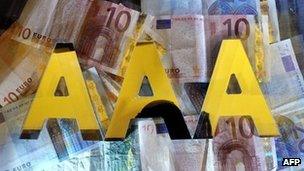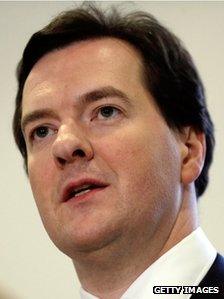Credit where it's due
- Published

The UK's AAA rating has been under threat for some time
The loss of an 'A' from Britain's credit rating is going to hurt, but it's not clear who's going to hurt most.
One of the least likely victims is the British economy itself.
Moody's warned it was looking at a possible downgrade in February last year, and other ratings agencies did likewise. So markets had probably priced in the impact.
The only major market open on Friday night when Moody's made the announcement was in currency, and the pound lost nearly a cent against the US dollar.
But sterling was having a bad week already (unless you're a British exporter, that is). There are other reasons for markets to take a negative view of the British economy. And now they have a weekend to digest the implications of the downgrade before trading starts again.
In any case, these big ratings agencies are only reflecting information that is already known, and known not only to those in the markets, but to those of us who take an interest in politics.
Test of discipline
The credit rating is a measure of how trustworthy sovereign bonds are, or how much you can rely on governments to deliver on the promise of payment that a bond represents.
That's a test of the discipline of the chancellor of the day, and the prospects of what is yet to come.
Britain remains highly unlikely to default, as Moody's new rating of 'AA1' suggests.
But given the implication of higher risk of default, it ought to follow that a lower credit rating would also mean a higher interest rate.
It hasn't worked out quite that way with the US or France, which were both downgraded last year.
Other factors have determined interest rates, including the relative appeal of other investments, and the flexibility of borrowers to get out of a fiscal mess.
The biggest impact that can be expected is in investment funds, including pension funds, where you may have been promised that at least part of the fund is invested in triple-A rated government bonds.
Those funds will now have to move out of UK bonds. But it's not clear where else they'll go. Of the major economies, only Canada and Germany retain triple-A rating.
'Downgrade chancellor'
The real victims of this downgrade are more likely to be in politics.
Chief amongst them is George Osborne, who used to treat protection of triple-A rating as a key target and measure of his economic competence and political virility.

Mr Osborne used to treat protection of the triple-A rating as a key target
That target shifted, when it was realised that it might be missed.
So this can easily be portrayed as failing the economic competency test, or as the BBC's Nick Robinson put it, Osborne risks being the 'downgrade chancellor'.
His party and his coalition partner can be similarly tainted.
So with the next Westminster election almost certainly being on the battleground of economic competence, both Tories and Lib Dems should worry about the electoral consequences of last night's announcement from Moody's.
That said, the downgrade is partly a measure of what happens after the 2015 Westminster election.
Because the original Osborne plan has been elongated well past the election date, and because the opinion polls do not point to continued Tory rule, the credit rating is a measure of what might replace the Osborne strategy.
And that's why Labour should be careful how it uses this valuable new ammunition.
Triple-A credibility
At least the SNP can enjoy the tarnishing of the United Kingdom's highly-valued triple-A credibility. The appeal to Scots of sticking with the union doesn't look so attractive, if Moody's is any guide.
That's true, but only up to a point. Because this now makes credit rating a key part of the political battleground, it focuses attention on what rating an independent Scotland could expect.
The 'Better Together' campaign has argued that the higher risk of an independent Scotland's bonds, carrying higher interest rates, would cost the Scottish Treasury £1bn per year - a suspiciously round number.

The finance secretary and others want much more deficit financing than George Osborne has allowed
In response, Finance Secretary John Swinney points out that he has balanced his budget every year he's been in power. He argues this is a sign of the fiscal discipline that can be expected of an independent Scottish administration.
He's absolutely right about his record, but the reason he's balanced his books is because he had no choice.
At the same time, he and others have been arguing for much more deficit financing than George Osborne has allowed. They want to borrow to spend, particularly on capital projects. In other words, they've balanced the books all right, but only under protest, while arguing that they should not be required to.
The whole point of independence, at least on the economy, is supposed to be about having the levers of power.
So an independent Scotland would be judged by Moody's and others on its credibility and its discipline.
Its Scandanavian neighbours are judged to have such qualities, and are judged to deserve a triple-A rating. So this isn't an issue about small and large nations.
It's an issue about track records. As with any borrower - individual, corporate or sovereign - your future credibility is derived from your past discipline.
It's a simple matter of fact that a track record at fiscal discipline is what the Scottish government lacks.
You can also comment or follow Douglas Fraser on Twitter: @BBCDouglsFraser